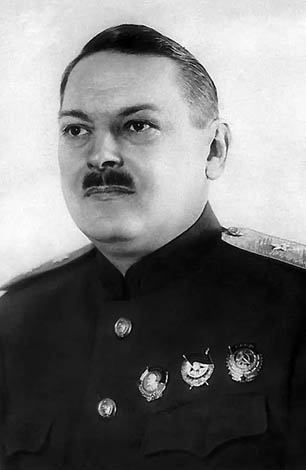Zhdanov, Andrei
Zhdanov, Andrei [Жданов, Андрей; Ždanov, Andrej], b 26 February 1896 in Mariupol, Katerynoslav gubernia, d 31 August 1948 in Moscow. Russian Bolshevik and Communist Party functionary. He was Joseph Stalin’s close confidant. After the Second World War he was placed in charge of Soviet cultural policy. His 1946 attacks on the literary journals Zvezda and Leningrad opened a campaign to rid Soviet culture of ‘servility before the West’ and ‘cosmopolitanism.’ In the ‘Zhdanovshchina’ period, Russian culture was promoted and ‘Zionism’ and ‘bourgeois nationalism’ were singled out for repression. In Ukraine such works as Mykola Petrovsky’s Istoriia Ukraïny (History of Ukraine, 1943) and Serhii Maslov and Yevhen Kyryliuk’s Narys istoriï ukraïns'koï literatury (Outline of the History of Ukrainian Literature, 1945) were criticized for nationalism. Ukrainian writers were roundly criticized: Andrii Malyshko, Yurii Yanovsky, Oleksii Kundzich, Stepan Oliinyk, Teren Masenko, Leonid Smiliansky, Oleksander Dovzhenko, Maksym Rylsky, Volodymyr Sosiura, and Ostap Vyshnia suffered repression. The editorial staffs of the Ukrainian journals Vitchyzna and Dnipro were replaced. Similar actions were taken in other spheres of Ukrainian culture. The main effect of this campaign was to push Ukrainian culture closer to Russian. In June 1990 the Central Committee of the Communist Party of Ukraine admitted that the Party’s cultural policy in the late 1940s and early 1950s had been ‘politically incorrect,’ and ‘rehabilitated’ many of the Ukrainian writers who had been prosecuted.
[This article originally appeared in the Encyclopedia of Ukraine, vol. 5 (1993).]
